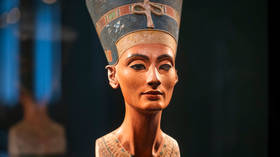Egyptian scientist calls for return of Nefertiti bust from Germany

Renowned Egyptian archaeologist Zahi Hawass has started a petition demanding the return of three historical artifacts, including the iconic pharaonic bust of Queen Nefertiti from the Neues Museum in Berlin, Reuters reported on Sunday.
The prominent former antiquities minister is also calling for the repatriation of the Rosetta Stone and the Dendera Zodiac to their homeland. In a statement on his website, Hawass said the petition was focused on unique objects “illegally” removed from Egypt.
He added that his efforts were centered on the bust of Nefertiti, which is held in the Neues Museum in Berlin, the Rosetta Stone in the British Museum, and the Dendera Zodiac in the Louvre, in Paris. Hawass described the items as “unique artifacts whose significance to Egyptian history has no parallel,” noting that their removal from Egypt was illicit.
The famous painted limestone bust of Queen Nefertiti was unearthed in 1912 during a German archaeological mission at Tell el-Amarna, approximately 300km (185 miles) south of Cairo. The site was the short-lived capital of Egypt’s 18th dynasty under Nefertiti’s husband, Pharaoh Akhenaten, who reigned until around 1335 BC.
“The Bust of Nefertiti was brazenly stolen from Egypt by the Germans in 1913 when it was concealed and smuggled out of the country despite laws that declared it illegal to remove ‘exceptional’ archaeological finds from Egypt. The Germans argue that they removed it legally because the French, who ran the Antiquities Service at the time, permitted them to,” the archaeologist stated.
Hawass argued that the illegal removal and sale of Egyptian artifacts only encouraged further theft and that museums which have refused to return such objects are perpetuating imperialism.
More than 200,000 people have already signed the petition, according to Hawass, but he needs to obtain one million signatures to officially request the repatriation of these iconic pieces. Representatives of the Neues Museum in Berlin have yet to comment.
In June, the University of Cambridge’s Museum of Archaeology and Anthropology (MAA Cambridge) temporarily returned 39 traditional artifacts looted from Uganda during British colonial rule. The items were sent back to Uganda under a long-term loan agreement, more than six decades after the country gained independence. According to Mark Elliott, MAA Cambridge’s senior curator in anthropology, the artifacts remain the property of the British Museum but are being loaned to Uganda for an initial period of three years.













